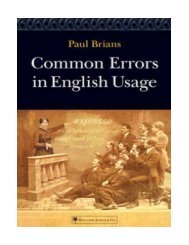url?sa=t&source=web&cd=3&ved=0CC0QFjAC&url=http://www.teachingenglish.org.uk/sites/teacheng/files/B369-Young-Learners-Activity-Book_v10
url?sa=t&source=web&cd=3&ved=0CC0QFjAC&url=http://www.teachingenglish.org.uk/sites/teacheng/files/B369-Young-Learners-Activity-Book_v10
url?sa=t&source=web&cd=3&ved=0CC0QFjAC&url=http://www.teachingenglish.org.uk/sites/teacheng/files/B369-Young-Learners-Activity-Book_v10
Create successful ePaper yourself
Turn your PDF publications into a flip-book with our unique Google optimized e-Paper software.
TeachingEnglish <strong>Young</strong> <strong>Learners</strong> <strong>Activity</strong> <strong>Book</strong><br />
Activities<br />
5. The speaker calls out a word, for example BLUE. The two children who have been<br />
named blue must run to the speaker and try to grab the handkerchief. They must not<br />
touch each other.<br />
6. The child who grabs the handkerchief first runs back to their team. If they manage to<br />
reach the team without being touched by the blue from the opposing team, they win the<br />
point. If the opposing blue manages to catch up with the runner and touch them, then no<br />
points are scored.<br />
7. The game continues until all the words have been called out. The team with the most points<br />
at the end is the winner.<br />
Notes<br />
If the two teams are unequal, use two speakers. This game is ideal for playing outside.<br />
Alternatives<br />
• If you have a large space, this game could be played in large classes by dividing the class<br />
into two or three groups of two teams that play at the same time.<br />
• You can make the scoring system more complicated. For example, when the speaker calls<br />
‘water’, no-one should move. If anyone moves, they lose a point for their team. If the speaker<br />
calls fire, all the players come to the centre and they have to find their opposite number.<br />
Both teams get a point for each pair that finds each other.<br />
• If you do not have enough space to have the teams standing in a line, the children can play<br />
from their seats. Make sure all the children from the same team are sitting near each other,<br />
preferably around the same desk. Give each team two or three soft objects. When the speaker<br />
calls out a word, the two children with that word have to grab the soft object and throw it to<br />
the speaker. The one the speaker catches first gets the point.<br />
• The seated version of the game can be played by larger classes as there can be three teams<br />
or more.<br />
No resources?<br />
This activity only requires a piece of paper and a handkerchief or piece of cloth.<br />
© British Council 2012<br />
39





